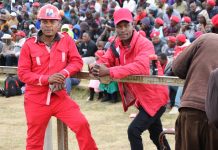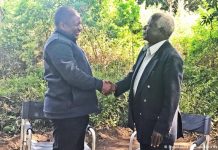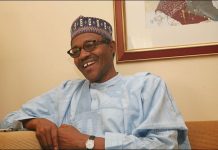Mozambican President Filipe Nyusi announced on Friday that later in the day he will send to the country’s parliament, the Assembly of the Republic, the proposals on decentralisation that he has agreed with Afonso Dhlakama, leader of the rebel movement Renamo.
Nyusi made this announcement at a meeting with members of the government who had come to his office to greet him on the occasion of his 59th birthday.
Nyusi revealed the substance of the proposals agreed with Dhlakama in a declaration broadcast to the nation on Wednesday.
The most striking feature of the proposals is the abolition of direct elections for mayors. If the Assembly accepts the proposal, then as from the municipal elections scheduled for October this year, the voters will only elect the municipal assembly. The political party (or coalition of parties, or independent group of citizens) that wins a majority of votes in the assembly election will propose the major from among the Assembly members.
If this goes through, there will never again be any mayoral elections or by-elections. If a mayor dies, or resigns, he will simply be replaced by the majority party.
A similar arrangement is envisaged for provinces and districts. The President of the Republic will appoint the Provincial Governor – but on the proposal of whichever party, coalition or group that obtained a majority of votes in the election for the Provincial Assembly. The Minister of State Administration will appoint the district administrator, but again on the proposal of the majority party in the district assembly.
Although billed as “decentralisation”, the real effect of these changes will be to concentrate power in the hands of political party machines. In municipalities, provinces and districts, it will not be the voters who decide who becomes mayor, governor or administrator, but the winning political party.
Under this new system, the only individuals whose names will be on ballot papers in the future will be the candidates for President of the Republic. Every other election will be by party list.
“I presented the decentralisation package earlier this week, and today I shall submit it to the Assembly”, announced Nyusi.
He said that he had spoken by telephone with Dhlakama again on Thursday, who said that the document put before the Assembly “need not be perfect, but it is necessary that Mozambican know about these things. I am satisfied. Really, it might not be perfect, but our effort is to make this project viable in order to serve Mozambicans. If there are people who have good ideas, there is still room for them to interact, discuss and improve the final text”.
These changes are so far-reaching that they will need to be enshrined in a constitutional amendment, and perhaps even a referendum.
Some jurists have pointed out that, according to the constitution, the “general rule” for designating office holders in elected bodies (such as provincial governors or mayors) is universal suffrage. It says nothing about electing such individuals indirectly through party majorities in the relevant assemblies.
Furthermore the constitution states that the principle of universal suffrage cannot be altered by a mere constitutional amendment passed by a two thirds majority in parliament. Instead, it is one of those matters regarded as so fundamental that it can only be altered by a referendum.
The constitution also states that the result of a referendum is only valid if more than half the electorate vote. Given the high rates of abstention in Mozambican elections, achieving a 50 per cent turnout might prove difficult. No referenda have ever been held in Mozambique, and the procedures for holding one have not yet been established.
Later on Friday morning, Nyusi met with members of the defence and security forces who were also bringing birthday greetings.
He told them he has been making every effort to guarantee and maintain reconciliation and peace. “We want the defence and security forces to concentrate on defending the country against external enemies, and nor spend their time on conflicts between Mozambicans,”Nyusi said. He wanted the defence and security forces to guarantee the security of all citizens living on Mozambican territory.










